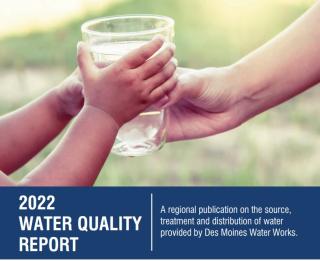2022 Water Quality Report

WHERE DOES YOUR WATER COME FROM?
The Raccoon and Des Moines Rivers are used to provide drinking water to more than 600,000 central Iowans. Upstream land use practices – agricultural and urban – have a direct effect on water quality and quantity for downstream users. All Iowans should Think Downstream and consider how they can help make Iowa’s water safe for drinking and recreation. Des Moines Water Works (DMWW) operates three water treatment plants in central Iowa. Each treatment plant involves a multi-barrier approach to ensure the safety of your drinking water. This includes source water monitoring, riverbank filtration, treatment processes of softening, filtration and disinfection, as well as distribution system monitoring and maintenance. The L.D. McMullen Water Treatment Plant at Maffitt Reservoir, located southwest of the metro area, treats up to 25 million gallons of water from six radial collector wells and one horizontal well along the Raccoon River, and serves customers in southwest Des Moines, Waukee and parts of Warren Water District, Clive, Urbandale and West Des Moines. The collection elements are located in the coarse sand and gravel formation beneath the river. The shallow groundwater receives natural filtration prior to entry into the wells. Saylorville Water Treatment Plant, located in northern Polk County, serves water to residents north of Des Moines. This facility treats up to 10 million gallons of water from two radial collector wells along the Des Moines River and utilizes ultrafiltration and reverse osmosis to soften and treat the water. All other areas in Des Moines Water Works’ service area receive water from the Fleur Drive Treatment Plant. This plant treats up to 75 million gallons of water pumped from one of three sources: Raccoon River, Des Moines River and an Infiltration Gallery (a series of underground pipes located throughout Water Works Park adjacent to the Raccoon River).
Find the full 2022 Water Quality Report here.

